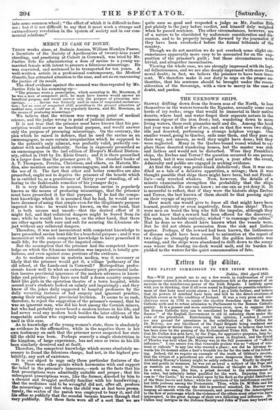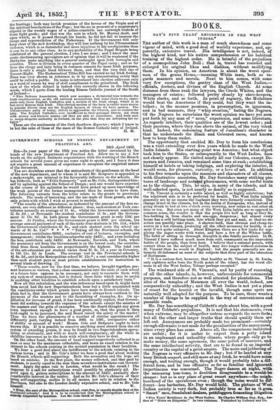Mfrs to flit Mar.
THE PAPIST COMMISSION TO THE IRISH BRIGADE.
Dublin, 20th April 1852. Sm.—Will you permit me to say a few words in confirmation of your courageous counsels in reference to the uneasiness felt at the prospect of an increase in the mischievous power of the Irish Brigade. I entirely agree with you in thinking, that if all were sound in England no possible reinforce- ment of that body need excite alarm ; but I go a little further, and believe that its powers of mischief have been and will be the direct creations of English errors as to the condition of Ireland. It was a very gross and mis- chievous error in 1793 to confer the elective franchise upon the Roman Catholic serfs and to refuse admission to Parliament to the Roman Catholic gentry. It is a grosser and more mischievous error, now, to suppose that the Roman Catholic laity can be conciliated by lending the " official in- fluence " of the English. Government to aid in reducing them under the yoke of the priesthoed. Entertaining this opinion, I confess I cannot see any ground 'for uneasiness in the substitution of Dr. Callen for Dr. Murray, nor any likelihood of the Papal Brigade being rendered ens whit strongevorfiercer than ever, nor yet any reason to believe that harm has been done by the passing of the Ecclesiastical Titles BilL The lad is, that Dr. Cullen was sent here, by the Pope, for aggressive purposes, long be- fore the reaction against Papal aggression arose in England, and the Synid of Thurles was held when Dr. Murray was in the full possession of "official influence." I can assure you that venerable prelate was no "object of mis- trust or ridicule" to arty one who wanted a place; nor did he advance to- wards his Protestant allies a hair's breadth too far for the taste of his follow- ing. Indeed, did we require an example of the truth of Gibbon's maxim, that the virtues of a priesthood are ever more dangerous than their vices, Archbishop Murray's history might be safely referred to. Kindly in dispoei- tion and gentle in manners, he was yet as loyal a subject of the Pope and as resolute an enemy to Protestant freedom of thought as Dr. Cullen. In a word, he was, like him, a priest devoted to the advancement of his order, but infinitely better qualified for the work. Enjoying free ac- cess to " the Castle," he was looked upon by his flock as the grand distributor of the State loaves and fishes ; while the quietness of his interference excited but little jealousy among the Protestants. Thus, while Dr. Miele and his fierce fellows were rousing the fold to practical mischief, Dr. Murray was keeping all smooth with the Government, and preventing the interruption to the flow of patronage which the violence of the others must otherwise have interrupted, to the great damage of their own following and influence. Dr. Cullen may intrigue in the Defence Society and John of Tuam may brawl on the hustings; both may lavish promises of the favour of the Virgin and of the spiritual benefactions of the Pope ; but the ms in presenti of a magistrate's stipend or the weekly wages of a police-constable can outweigh bushels of those light goods; and that was the coin in which Dr. Murray dealt, and upon which, as it passed through his hands, he did not fail to impress the image and superscription of the Fisherman. If the Government will only keep clear of the new Archbishop, they will lose nothing by his tfltmniontane violence, which is as distasteful and more injurious to his ooreligioniets than it can be to any other class. As to any probability of the Papal Brigade being reinforced at the general election, I own I see none ; and I know the most acute electioneering speculators are of opinion that it will be weakened if the Derbyites make anything like a general onslaught upon both boroughs and counties. There is division in every quarter of the Papal camp ; and so far from the clergy and laity being in common consent for mere Irish purposes, there is only a single bond between them, and that the very frail one of Tenant-Right. The Ecclesiastical Titles Bill has excited no lay Irish feeling. None was ever shown in reference to it by any demonstrating entity that could be called a public. Its name is introduced into election addresses only as a word of course by way of civil compliment to the priesthood. The Irish view of the whole subject is indeed very correctly shown in the following words, which I quote from the leading Roman Catholic journal of the South of Ireland- .. This Defence Association, which now assumes a dictatorial tone towards the Irish constituencies, as the old national associations had some claim to do, repre- sents only these English Catholics, and a section of the Irish clergy, which is us fact more Roman than Irish. This clerical section of the body is rather more averse to popular liberty than are the English laymen of whom we have spoken. The IT1tramontane party of today, strives to aggrandize the Church, and to enslave the laity. The English Catholics, ever indifferent to their personal liberty, aid them with money and historic names—all they are able to contribute. And both seek to usurp despotic authority in Ireland, on the plea that they are defending her re- ligion."
These are the sentiments of the Cork Southern Reporter; which I know to be but the echo of those of the mass of the Roman Catholio laity of Ireland. IL Al.



























 Previous page
Previous page